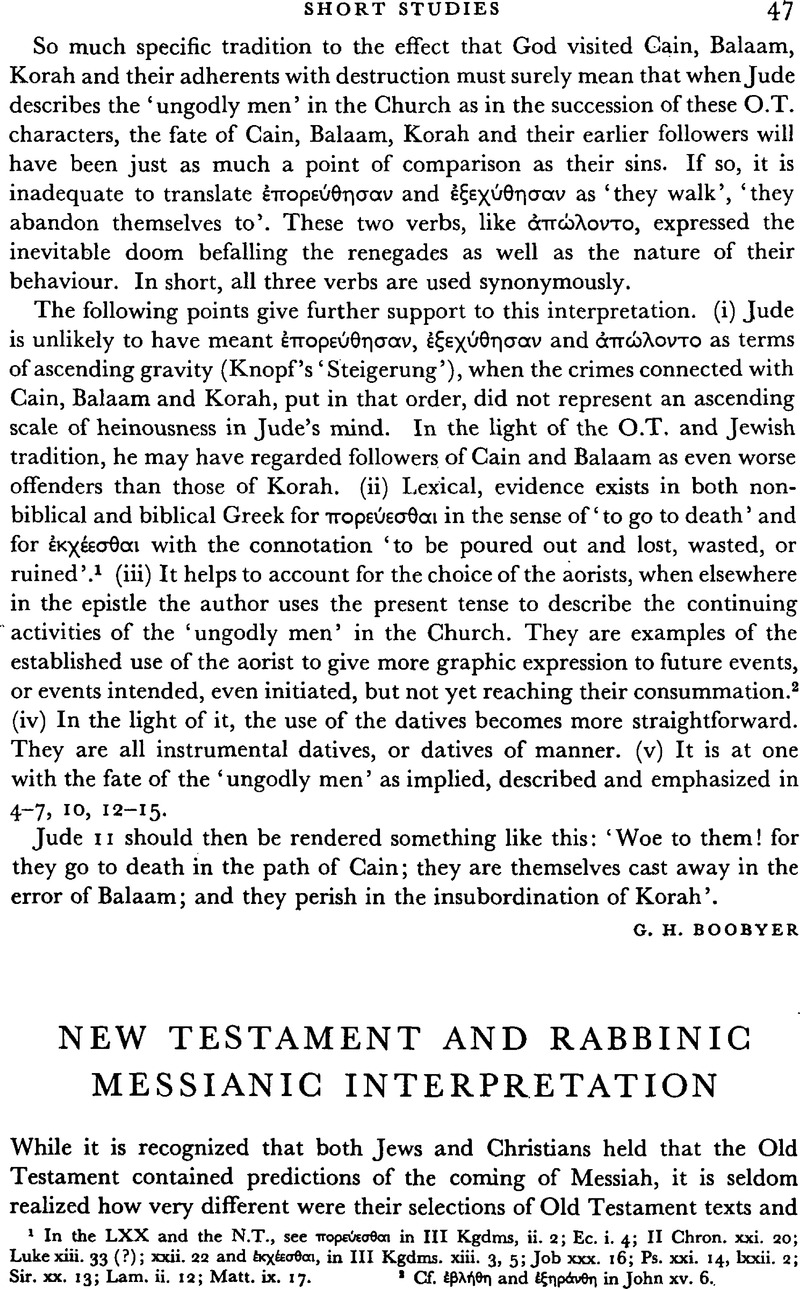Article contents
New Testament and Rabbinic Messianic Intespretation
Published online by Cambridge University Press: 05 February 2009
Abstract

- Type
- Short Studies
- Information
- Copyright
- Copyright © Cambridge University Press 1958
References
page 47 note 1 In the LXX and the N.T., see πορεύεσθαι in III Kgdms, ii. 2; Ec. i.4; II Chron. xxi. 20; Luke xiii. (?); xxii. 22 and έκχέεσθαι, in III Kgdms. xiii. 3, 5; Job xxx. 16; Ps. xxi. 14, lxxii. 2; Sir. xx. 13; Lam. ii. 12; Matt. ix. 17.Google Scholar
page 47 note 2 Cf.έβλήθη and έξηράνθη in John xv. 6.Google Scholar
page 48 note 1 Cf. Manson, T. W., The Sayings of Jesus (1949), pp. 69 ff.Google Scholar Also Strack-Billerbeck, , Kommentar zum Neuen Testament, IV, 781–98.Google Scholar
page 48 note 2 Old Testament references are Isa. xi. i, Jer. xxiii. 5 and Micah v. 2. See Bereshith, R. 85 and 99 where Isa. xi. I is interpreted messianically. So too Yalkut, i. 247d. The Targum on Jer. xxiii. 5 says, ‘I will raise up for David the Messiah the Just’. Micah v. 2 is interpreted messianically in the Targum and in pirque de Rabbi Eliezer, c. 3.Google Scholar
page 48 note 3 See Midrash, Bereshith, R. 99.Google Scholar
page 48 note 4 This passage is commented upon extensively as being Messianic in character. E.g. the Midrash on Gen. xxxii. 6 says, ‘R. Nehemiah said…Ass refers to the royal Messiah, for it says of him, Lowly, and riding upon an ass (Zech. ix. 9)’. See also Sanhedrin, 98 a, Pirqe de Rabbi Eliezer, c 31. A full list of such references may be seen in Strack-Billerbeck, op. cit. I, 842–4.Google Scholar
page 49 note 1 Unless we include his birth in Bethlehem.Google Scholar
page 49 note 2 Cf. Bereshith, R. 42, 4 ‘If you see the kingdoms contending with each other look for the foot of the Messiah. Know that it will be so, because it happened thus in the days of Abraham. When the kingdoms strove with each other (Gen. xiv), redemption came to Abraham.’Google Scholar
page 49 note 3 See Midrash on Ps. xvii. 13, Megillah, 11a, and Sanhedrin, 97b.Google Scholar
page 49 note 4 In this connexion see the Midrash on Lam. i. 2. In this curious passage, it is said that as the children of Israel sinned from aleph to tau, so God would comfort them in the latter days from aleph to tau. Passages of scripture are quoted in each case commencing with the various letters of the alphabet. One of the verses cited as applying in the days of the Messiah is Isa. xl. 3. Isa. xl. 1 is also quoted.Google Scholar
page 49 note 5 See Sotah, 9, 15: ‘With the footprints of the Messiah…children shall shame the elders, and the elders shall rise up before the children, for the son dishonoureth the father, the daughter riseth up against her mother, the daughter-in-law against her mother-in-law: a man's enemies are the men of his own house.’ See too the Midrash on Song of Sol. ii. 13.Google Scholar
page 50 note 1 Pesachim, 118b: ‘Egypt is destined to bring a gift to the Messiah. He will think not to accept it from them, but the Holy One, blessed be He, will instruct him, ‘Accept it from them: they furnished hospitality to My children in Egypt.” Immediately, ‘Nobles shall come Out of Egypt (bringing gifts).’Google Scholar
page 50 note 2 This is in the Midrash on Lam. iii. 49.Google Scholar
page 50 note 3 See G. Dalman, Jesus—Jeshua, p. 46.Google Scholar
page 50 note 4 See Manson, W., Jesus the Messiah (1943), p. 168.Google Scholar
page 50 note 5 See Midrash on Ps. ii. 7, and Yalkut, ii. 104d.Google Scholar
page 50 note 6 Genesis, R. 98. 9: ‘For what purpose will the royal Messiah come, and what will he do? He will come to assemble the exiles of Israel and to give them (the Gentiles) thirty precepts, as it says, And I said unto them: If ye think good, give me my hire: and if not forbear. So they weighed for my hire thirty pieces of silver (Zech. xi. 12). Rab said: This alludes to thirty mighty men. R. Johanan said, It alludes to thirty precepts.’Google Scholar
page 51 note 1 In the Midrash on Ps. xviii. 35, Ps. cx. I is specifically applied to the Messiah, but not as relating to his ascension.Google Scholar
page 51 note 2 It is most probable, however, that Jesus used this verse as an expression of the general truth that when a leader is struck down his followers disperse, rather than as a Messianic prediction, for otherwise his interpretation is so very diverse from the Old Testament intention.Google Scholar
page 52 note 1 Rachel's sepulchre is said to be ‘in the border of Benjamin’ (I Sam. X. 2), about five miles north of Jerusalem. But in Gen. XXXV. 19 her grave is located ‘in the way to Ephrath’, which a gloss identifies with Bethlehem. This, of course, is not ‘in the border of Benjamin’. It is likely we have here two traditions combined. Matthew chooses, however, to identify Ramah with Bethlehem, and is thus able to apply this verse to the later event that occurred there, the Massacre of the Innocents. Apart from this uncertain geographical connexion and the expression of great sorrow the passages are quite diverse.Google Scholar
- 1
- Cited by


